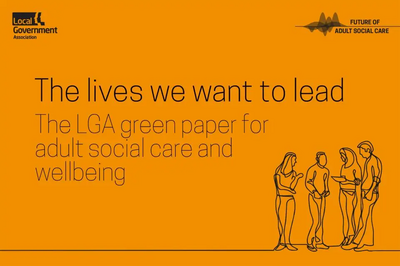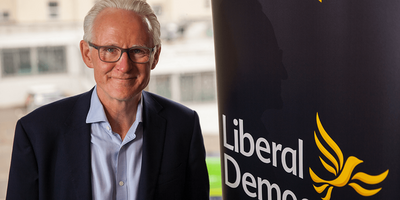Funding Adult Social Care - LGA launches public consultation
FACING UP TO ONE OF THE BIGGEST SOCIAL ISSUES OF OUR TIME - Funding adult social care

The Local Government Association, with cross party support, has launched a nationwide consultation to kick-start a desperately-needed debate on how to pay for adult social care and rescue the services caring for older and disabled people from collapse following the Government's failure to act.

The public consultation - the biggest launched by the LGA - is seeking the views of people and organisations from across society on how best to pay for care and support for adults of all ages and their unpaid carers, and aims to make the public a central part of the debate.
Liberal Democrat MP and former health minister Norman Lamb has long campaigned on this issue and led the call for a cross-party group of 90 MPs, including select committee chairs and former cabinet ministers, to write to the prime minister urging the government to establish an NHS and Care Convention to find a sustainable long-term settlement for these services. To date and in advance of the government green paper, now scheduled to be published in Autumn 2018, the House of Commons Health and Social Care and Housing, Communities and Local Government Committees published a joint report: Long-term funding of adult social care.
Lib Dem Group Leader, Councillor Howard Sykes speaking about the LGA Consultation said:
"Years of significant under-funding of councils, coupled with rising demand and costs for care and support, have combined to push adult social care services to breaking point. We cannot wait any longer for the government to act".
"Since 2010 councils have had to bridge a £6 billion funding shortfall just to keep the adult social care system going. In addition the LGA estimates that adult social care services face a £3.5 billion funding gap by 2025, just to maintain existing standards of care, while latest figures show that councils in England receive 1.8 million new requests for adult social care a year - the equivalent of nearly 5,000 a day.
"Short-term cash injections have not prevented care providers reluctantly closing their operations or returning contracts to councils and less choice and availability to a rising number of people with care needs. This is increasing the strain on an already-overstretched workforce and unpaid carers, and leading to more people not having their care needs met.
"Increased spend on adult social care - which now accounts for nearly 40 per cent of total council budgets - is threatening the future of other vital council services, such as parks, leisure centres and libraries, which help to keep people well and from needing care and support and hospital treatment.
"The eight-week consultation sets out options for how the system could be improved and the radical measures that need to be considered given the scale of this funding crisis. Possible solutions to paying for adult social care in the long-term outlined in the consultation include:
- Increasing income tax for taxpayers of all ages - a 1p rise on the basic rate could raise £4.4 billion in 2024/25, (similar to what the Lib Dems pushed for at the last general election)
- Increasing national insurance- a 1p rise could raise £10.4 billion in 2024/2
- A Social Care Premium - charging the over-40s and working pensioners an earmarked contribution (such as an addition to National Insurance or another mechanism). If it was assumed everyone over 40 was able to pay the same amount (not the case under National Insurance), raising £1 billion would mean a cost of £33.40 for each person aged 40+ in 2024/25.
- means testing universal benefits, such as winter fuel allowance and free TV licences, could raise £1.9 billion in 2024/25
- Allowing councils to increase council tax - a one per cent rise would generate £285 million in 2024/25
END
